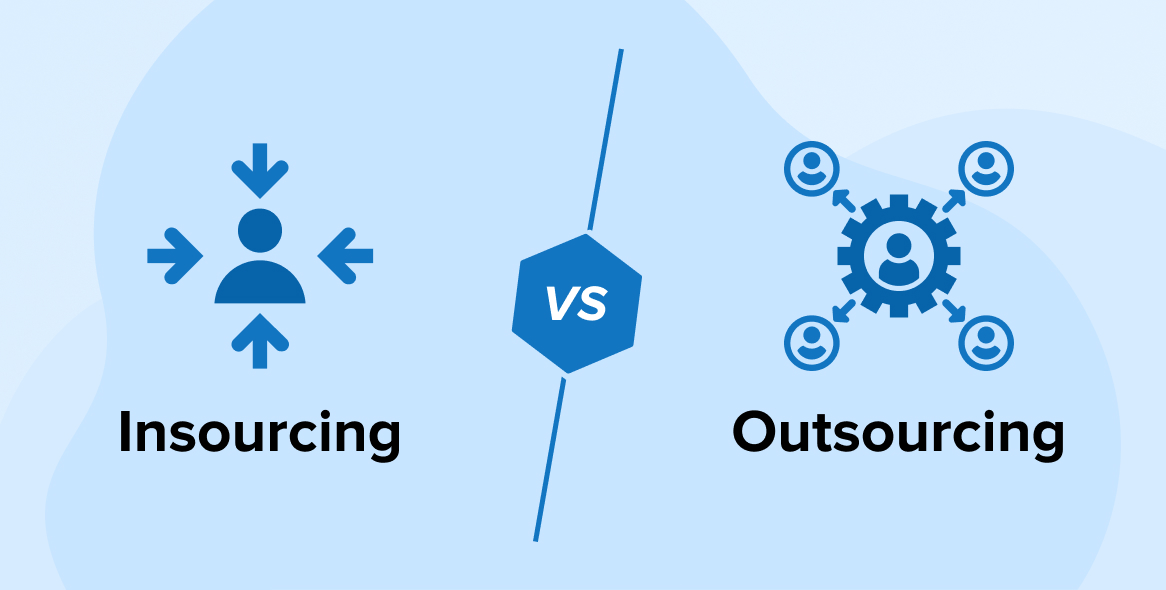In the modern business landscape, the concept of “Outsourcing “Often referred to as “contracting out” has become extremely popular and essential. It’s a strategy where a company hires an external entity to carry out specific tasks, projects, or produce products according to defined requirements, instead of handling all operations in-house.

Definition and Application in Business
Mục lục
Differentiating Insourcing and Outsourcing

Insourcing helps a business harness its internal capabilities, tightly control processes, and integrate various departments. This approach is suitable when the company wants to protect sensitive information and avoid sharing business knowledge with outsiders.
Outsourcing allows organizations to capitalize on the advanced knowledge and technology of outside entities. It enables companies to focus on core elements and free up resources for higher-value tasks.
The Emergence and Growth of Outsourcing

Advantages and Disadvantages of Outsourcing
Advantages of Outsourcing in Business
- Superior Specialization: Outsourcing companies often have deep expertise in their field, saving businesses time and costs when specialized skills are required. This ensures high-quality work, allowing the business to focus on more important tasks.
- Operational Cost Savings: Outsourcing reduces costs associated with personnel, insurance, and employee benefits. The external partner already has resources and equipment, minimizing the need for extensive investment by the hiring company.
- Access to Advanced Technology: Outsourcing partners often possess the latest technology, enabling the business to adopt it without substantial investment.
- Optimized Workforce Efficiency: By outsourcing, companies can save time and easily implement parallel tasks across departments.
- Reduced Workspace Requirements: Outsourcing helps businesses save office space, making it ideal for those with limited workspace.
- Enhanced Internal Development: Outsourcing allows in-house staff to be motivated to develop their skills, preparing them for more strategic tasks in the future.
Disadvantages of Outsourcing
- Information Security: Outsourcing may expose internal information to external parties, making data security a critical consideration.
- Unequal Responsibility: Not all Outsourcing companies have high responsibility standards; some may not meet the quality or timelines expected.
- Variable Quality: External partners may not fully understand the specific requirements, leading to inconsistent quality.
- Additional Costs: Although usually more cost-effective than in-house execution, Outsourcing can incur unexpected costs if contracts are not clear.
Key Factors for Successful Outsourcing

- Clearly Define Strategic Goals: Businesses should clearly define their objectives and desired outcomes, ensuring resources are allocated effectively.
- Build Strong Relationships: A good relationship with outsourcing partners facilitates effective communication and optimizes work quality.
- Support the Outsourcing Partner: Providing necessary information, documentation, and support helps the partner understand and execute tasks to the highest standard.
- Establish a Detailed Contract: A specific, well-defined contract safeguards the rights of both parties and clarifies responsibilities and commitments.
Distinguishing Product Companies from Outsourcing Companies
- Product Companies: These companies develop and promote their own products, aimed at end users. They handle the entire process from ideation to consumer engagement.
- Outsourcing Companies: These companies perform tasks upon request from other businesses and do not own the products or services they work on. Their clients are companies seeking support for services or specific projects, such as Outsource Marketing.
